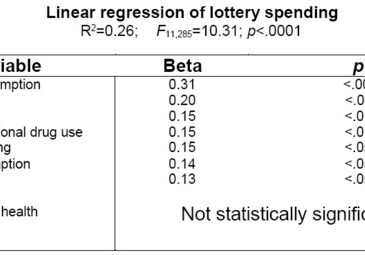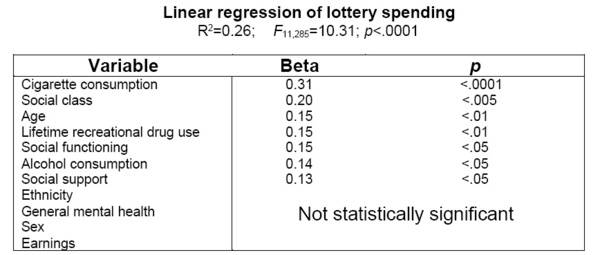The British National Lottery, started in 1994, is now the largest lottery in the world. Its size and national scope have made it an apt subject for numerous reseachers in the field of gambling studies. Reid, Woodford, Roberts, Golding, & Towell (1999) used the Lottery as the basis for their investigation of gambling and its health correlates. An opportunity sample of 780 adults recruited from various employers and a university were given an instrument consisting of a variety of demographic, gambling, and health-related items. The 61.8% response rate yielded 482 completed questionnaires (183 from women, 299 from men). Health behaviors examined included cigarette, alcohol, and drug use in addition to mental health items from the General Health Questionnaire. Emotional health variables such as degree of social support and social functioning were also measured. In an atttempt to build a model, the authors performed a regression analysis using lottery spending as their dependent variable. The table below indicates Betas for those factors that were statistically significant.
The authors found that spending on the British Lottery was correlated with poor social functioning, lower frequency of social support, higher consumption of drugs and alcohol, and other variables. It should be noted that the Beta coefficients reported for social support and social functioning are positive, while the article clearly indicates that these correlations are negative. It is possible that the scales used for these two variables had an inverted design; that is, a high scale score indicated poor functioning and infrequent support. Although opportunity samples are not ideal, the sample assembled in this study is demographically diverse and large. The model presented above explains only 26% of the variance of the dependent variable, but the relationships noted provide a groundwork on which further studies can be built.
Source: Reid, S., Woodford, S.J., Roberts, R., Golding, J.F., & Towell, A.D. (1999). Health-related correlates of gambling on the British National Lottery. Psychological Reports, 84, 247-254.
This public education project is funded, in part, by The Andrews Foundation and the National Center for Responsible Gaming.





